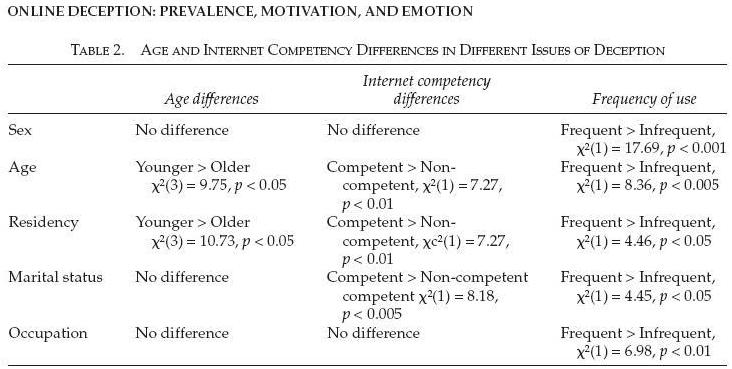Deception in Online Dating
Sara Blair, Marshall Cooper, Shannon Fahnestock
Frequency and Magnitude
How often does deception occur in online dating? One study found that 81% of the participants lied on at least one aspect of their online dating profiles. Weight, height, and age were the three most frequently lied about characteristics, respectively. Participants were least likely to lie about their relationship information and whether they have children. These characteristics are ones that are critical in forming a relationship, which may explain why participants are more truthful; your date won’t make you step on the scale to prove your weight, but they might notice two children in the house when your profile said you didn’t have any (Toma et al., 2008). There are some aspects of online dating profiles that people tend to lie about more commonly. A study by Caspi and Gorsky (2006) that looked at what online dating users were deceptive about, the authors found that 27% lied about their sex, 45% lied about their age, 44% about residence, 21% about occupation, and 20% about their marital status. In all other profile aspects, less than 10% reported deception.
When looking at the frequency of online deception by demographic some differences arise. While gender had no effect on the frequency of online deception, age did. Younger users were more likely to deceive in online communication. Competent users did not deceive more than non-competent users. This implies that familiarity with using internet communication does not increase the tendency to deceive. In looking at the frequency of use, those that used the internet more than three hours per day were more likely to deceive in internet communication than infrequent users. This could be because those who deceive, specifically those who take part in identity manipulation, live through the internet under that different identity, rather than in offline interactions (Caspi & Gorsky, 2006).
While deception does occur at least somewhat regularly, the magnitude of the online dating deception is usually small. A study done by Toma et al. (2008) found that the average magnitude of deception about one’s height was only 2.09% different than the participants actual heights, an deception about weight was on average 5.5% lower than participants actual weights. Although the magnitude of deception is found to be generally small, there were a few extreme lies, including one online dater’s 3 inch lie about his or her height, another’s 35 pound lie about weight, and an a third online dater’s 11 year age difference. Although these extreme lies are not as prevalent, they will have more of an effect when encountered, and thus are expected to be discussed more when they occur, which can explain why people believe that deception is so prevalent in online dating (Toma et al., 2008).
No correlation was found between lying on one characteristic versus another, which can imply that most people are lying about a specific trait which they believe to be undesirable, rather than deceiving just to deceive. Some have found that lying about one aspect on an online dating profile may decrease the need to lie in other areas of the profile. An example of this would be if people lie about their height and then not feel the need to lie about weight in order to appear slender. This shows the strategic nature in deceiving in online dating (Toma et al., 2008). Of the online daters who have deceived online only 29% of participants claimed to sometimes, often, or always deceive online. Only 20% of these participants reported that they believed that the person they were communicating with suspected them of deceiving. Another interesting finding was that 73% of the participants believed that online deception is very widespread even though not many reported being deceptive themselves (Caspi & Gorsky, 2006).
